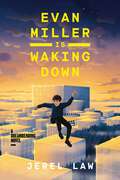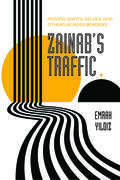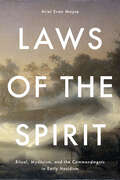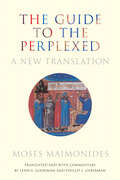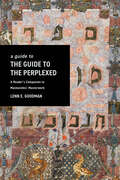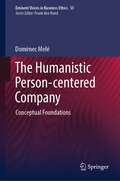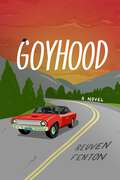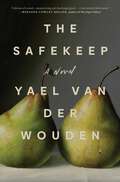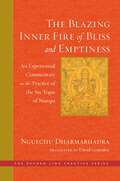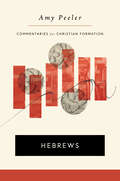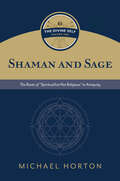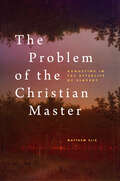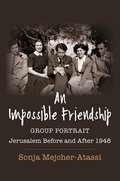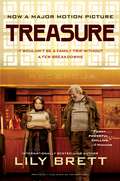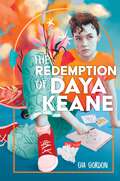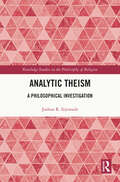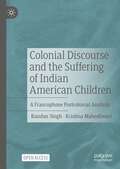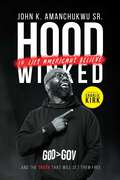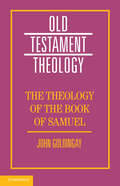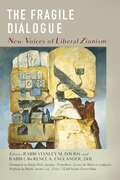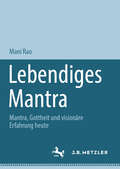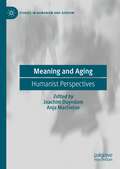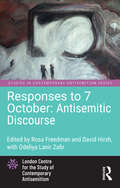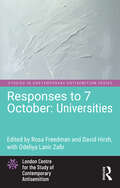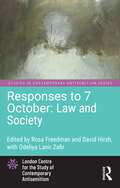- Table View
- List View
Evan Miller Is Waking Down: A Dreambending Novel
by Jerel LawWhat if dreams were dangerous? What if your strongest abilities made you a fugitive? Tweens and middle grade readers who enjoy dystopian and fantasy fiction will be pulled into a world of secrets, control, and power in this novel from Jerel Law, the author of the Jonah Stone: Son of Angels series.In City 47, uniformity is celebrated, individuality is stamped out, and the Elders who run the government demand strict obedience to an ancient writing called the Primary Code. It's been like this ever since the Incident. Fifteen-year-old Evan Miller has an increasingly disruptive secret--a powerful ability that has attracted the attention of the Elders. When disguising himself as ordinary is no longer an option, he's forced to flee to the place he fears the most. What will he discover about the true past of City 47, the Elders, and himself in the forbidden Old City?Evan Miller Is Waking Down: A Dreambending Novelexplores the power of dreams and the cost of conformity;encourages readers to be themselves and pursue the truth; andis perfect for fans of The City of Ember, supernatural fiction, and mysteries.Older children 11 to 14 will dream, question, and find power within their own gifts as they follow Evan's journey from typical teen to revolutionary for truth.
Zainab’s Traffic: Moving Saints, Selves, and Others across Borders (Atelier: Ethnographic Inquiry in the Twenty-First Century #16)
by Emrah YildizWhat is the value—religious, political, economic, or altogether social—of getting on a bus in Tehran to embark on an eight-hundred-mile journey across two international borders to the Sayyida Zainab shrine outside Damascus? Under what material conditions can such values be established, reassessed, or transgressed, and by whom? Zainab’s Traffic provides answers to these questions alongside the socially embedded—and spatially generative—encounters of ritual, mobility, desire, genealogy, and patronage along the route. Whether it is through the study of the spatial politics of saint veneration in Islam, analysis of cross-border gold trade and sanctions, or examination of pilgrims women’s desire for Syrian lingerie accompanying their pleas with the saint in marital matters, the book develops the idea of visitation as a ritual of mobility across geography, history, and category. Iranian visitors’ experiences on the road to Sayyida Zainab—emerging out of a self-described "poverty of mobility"—demonstrate the utility of a more capacious anthropological understanding of ritual. Rather than thinking of ritual as a scripturally canonized manual for pious self-cultivation, Zainab’s Traffic approaches ziyarat as a traffic of pilgrims, goods, and ideas across Iran, Turkey, and Syria.
Laws of the Spirit: Ritual, Mysticism, and the Commandments in Early Hasidism (Stanford Studies in Jewish History and Culture)
by Ariel Evan MayseThe compelling vision of religious life and practice found in Hasidic sources has made it the most enduring and successful Jewish movement of spiritual renewal of all time. In this book, Ariel Evan Mayse grapples with one of Hasidism's most vexing questions: how did a religious movement known for its radical views about immanence, revelation, and the imperative to serve God with joy simultaneously produce strict adherence to the structures and obligations of Jewish law? Exploring the movement from its emergence in the mid-1700s until 1815, Mayse argues that the exceptionality of Hasidism lies not in whether its leaders broke or upheld rabbinic norms, but in the movement's vivid attempt to rethink the purpose of Jewish ritual and practice. Rather than focusing on the commandments as law, he turns to the methods and vocabulary of ritual studies as a more productive way to reckon with the contradictions and tensions of this religious movement as well as its remarkable intellectual vitality. Mayse examines the full range of Hasidic texts from the eighteenth and early nineteenth centuries, from homilies and theological treatises to hagiography, letters, and legal writings, reading them together with contemporary theories of ritual. Arguing against the notion that spiritual integrity requires unshackling oneself from tradition, Laws of the Spirit is a sweeping attempt to rethink the meaning and significance of religious practice in early Hasidism.
The Guide to the Perplexed: A New Translation
by Moses MaimonidesA landmark new translation of the most significant text in medieval Jewish thought. Written in Arabic and completed around 1190, the Guide to the Perplexed is among the most powerful and influential living texts in Jewish philosophy, a masterwork navigating the straits between religion and science, logic and revelation. The author, Rabbi Moses ben Maimon, commonly known as Maimonides or as Rambam, was a Sephardi Jewish philosopher, jurist, and physician. He wrote his Guide in the form of a letter to a disciple. But the perplexity it aimed to cure might strike anyone who sought to square logic, mathematics, and the sciences with biblical and rabbinic traditions. In this new translation by philosopher Lenn E. Goodman and historian Phillip I. Lieberman, Maimonides' warm, conversational voice and clear explanatory language come through as never before in English. Maimonides knew well the challenges facing serious inquirers at the confluence of the two great streams of thought and learning that Arabic writers labeled 'aql and naql, reason and tradition. The aim of the Guide, he wrote, is to probe the mysteries of physics and metaphysics. But mysteries, to Maimonides, were not conundrums to be celebrated for their obscurity. They were problems to be solved. Maimonides' methods and insights resonate throughout the work of later Jewish thinkers, rationalists, and mystics, and in the work of philosophers like Thomas Aquinas, Spinoza, Leibniz, and Newton. The Guide continues to inspire inquiry, discovery, and vigorous debate among philosophers, theologians, and lay readers today. Goodman and Lieberman's extensive and detailed commentary provides readers with historical context and philosophical enlightenment, giving generous access to the nuances, complexities, and profundities of what is widely agreed to be the most significant textual monument of medieval Jewish thought, a work that still offers a key to those who hope to harmonize religious commitments and scientific understanding.
A Guide to The Guide to the Perplexed: A Reader’s Companion to Maimonides’ Masterwork
by Lenn GoodmanIn this volume, noted philosopher Lenn E. Goodman shares the insights gained over a lifetime of pondering the meaning and purpose of Maimonides' celebrated Guide to the Perplexed. Written in the late twelfth century, Maimonides' Guide aims to help religiously committed readers who are alive to the challenges posed by reason and the natural sciences to biblical and rabbinic tradition. Keyed to the new translation and commentary by Lenn E. Goodman and Phillip I. Lieberman, this volume follows Maimonides' life and learning and delves into the text of the Guide, clearly explaining just what Maimonides means by identifying the Talmudic Ma'aseh Bereshit and Ma'aseh Merkavah with physics and metaphysics (to Maimonides, biblical cosmology and theology). Exploring Maimonides' treatments of revelation, religious practice and experience, law and ritual, the problem of evil, and the rational purposes of the commandments, this guide to the Guide explains the tactics Maimonides deployed to ensure that readers not get in over their heads when venturing into philosophical deep waters.
The Humanistic Person-centered Company (Issues in Business Ethics #55)
by Domènec MeléHumanism in business is not only an alternative to economism but a way to human excellence. Humanism presented here revolves around the rich notion of “human person”, keystone of modern personalist philosophy and Catholic Social Teaching. From this perspective this book is offered to everyone, believer and nonbeliever alike. The person-centered humanism considers the human-wholeness, individual and relational, with subjectivity, self-determination, openness to transcendence, and with capacity not only to possess but also to give. It also highlights the uniqueness of each person, endowed with a high constitutive dignity and in continuous process of flourishing toward human plenitude. An attitude of respect and good will is due to non-personal beings, while persons deserve to be treated with justice and even with love of benevolence. The book is prepared in dialogue with mainstream of thought in business and business ethics and focused on exploring ways to improve some conventional views. It includes some proposals such as a person-based ethics, ethics understood as intrinsic to business activity, the consideration of the company as an organized community of persons, and the purpose of the company oriented toward the common good through a double mission, internal and external. It is also suggested substituting the notion of “stakeholder” for the richer one of “relationholder.”
Goyhood: A Novel
by Reuven FentonReuven Fenton's novel Goyhood is a brilliant debut about a devoutly Orthodox Jewish man who discovers in middle age that he's not, in fact, Jewish, and embarks on a remarkable road trip to come to grips with his fate; it's Chaim Potok's The Chosen meets Planes,Trains and Automobiles.Funny, poignant, and revelatory while plumbing the emotional depths of the relationship between estranged brothers, Goyhood examines what happens when one becomes unmoored from a comfortable, spiritual existence and must decide whether coincidence is in fact destiny. When Mayer (née Marty) Belkin fled small town Georgia for Brooklyn nearly thirty years ago, he thought he'd left his wasted youth behind. Now he's a Talmud scholar married into one of the greatest rabbinical families in the world - a dirt poor country boy reinvented in the image of God. But his mother's untimely death brings a shocking revelation: Mayer and his ne'er-do-well twin brother David aren't, in fact, Jewish. Traumatized and spiritually bereft, Mayer's only recourse is to convert to Judaism. But the earliest date he can get is a week from now. What are two estranged brothers to do in the interim? So begins the Belkins' Rumspringa through America's Deep South with Mom's ashes in tow, plus two tagalongs: an insightful Instagram influencer named Charlayne Valentine and Popeye, a one-eyed dog. As the crew gets tangled up in a series of increasingly surreal adventures, Mayer grapples with a God who betrayed him and an emotionally withdrawn wife in Brooklyn who has yet to learn her husband is a counterfeit Jew.
The Safekeep
by Yael van der Wouden&“Mesmerizing and shockingly good…I was utterly blown away.&” —Miranda Cowley Heller, author of The Paper Palace • &“A brilliant debut, as multifaceted as a gem.&” —Kirkus Reviews (starred review) • &“Moving, unnerving, and deeply sexy.&” —Tracy Chevalier, author of Girl with the Pearl Earring • &“Riveting…Serious, elegant, sexy, devastating.&” —Julia May Jonas, author of Vladimir An exhilarating, twisted tale of desire, suspicion, and obsession between two women staying in the same house in the Dutch countryside during the summer of 1961—a powerful exploration of the legacy of WWII and the darker parts of our collective past.A house is a precious thing... It is 1961 and the rural Dutch province of Overijssel is quiet. Bomb craters have been filled, buildings reconstructed, and the war is truly over. Living alone in her late mother&’s country home, Isabel knows her life is as it should be—led by routine and discipline. But all is upended when her brother Louis brings his graceless new girlfriend Eva, leaving her at Isabel&’s doorstep as a guest, to stay for the season. Eva is Isabel&’s antithesis: she sleeps late, walks loudly through the house, and touches things she shouldn&’t. In response, Isabel develops a fury-fueled obsession, and when things start disappearing around the house—a spoon, a knife, a bowl—Isabel&’s suspicions begin to spiral. In the sweltering peak of summer, Isabel&’s paranoia gives way to infatuation—leading to a discovery that unravels all Isabel has ever known. The war might not be well and truly over after all, and neither Eva—nor the house in which they live—are what they seem. Mysterious, sophisticated, sensual, and infused with intrigue, atmosphere, and sex, The Safekeep is a brilliantly plotted and provocative debut novel you won&’t soon forget.
The Blazing Inner Fire of Bliss and Emptiness: An Experiential Commentary on the Practice of the Six Yogas of Naropa (The Dechen Ling Practice Series)
by David GonsalezA set of commentaries that present some of the most rarefied and secret teachings within Tibetan Buddhism from the perspective of the Dalai Lama&’s Gelug school.The Blazing Inner Fire of Bliss and Emptiness presents lucid translations of a pair of detailed commentaries by the famed Tibetan tantric master Ngulchu Dharmabhadra (1772–1851), illuminating a set of extremely secret and restricted tantric practices of highest yoga tantra. The first of these commentaries details the practices of the Six Yogas of Naropa, one of the most celebrated and revered systems of completion-stage practice in Tibet. Dharmabhadra presents the Six Yogas by elaborating upon Lama Tsongkhapa&’s (1357–1419) masterpiece on the subject entitled Endowed with the Three Inspirations, which served as the basis for nearly all subsequent commentaries on the Six Yogas within the Gelug tradition. Ngulchu Dharmabhadra&’s commentary is unique in that it presents the Six Yogas within the context of Vajrayogini practice, making this book a perfect companion piece to The Extremely Secret Dakini of Naropa (Wisdom Publications, 2020). Also contained in this book is Ngulchu Dharmabhadra&’s lucid and concise commentary on the First Panchen Lama&’s (1570–1662) famous Supplication for Liberation from [Fear of] the Perilous Journey of the Intermediate State. The prayer—a beautiful literary contribution from the First Panchen Lama in its own right—invokes the immediacy of death and the potential to use the process of dying as an opportunity for liberation. The prayer extols the efficacy of the &“nine mixings&” of the completion stage as direct means of transforming our ordinary death process by using advanced yogas presented in the first commentary on the Six Yogas. Together, these works present the reader with a vast and profound vision of spiritual transformation—one in which every aspect of human experience can be used as an opportunity for transcendence and spiritual liberation.
Hebrews: The Family Of God In The Epistle To The Hebrews (Commentaries for Christian Formation (CCF))
by Amy PeelerHow can the Letter to the Hebrews help Christians grow in their faith? The Letter to the Hebrews tells us that God is trustworthy—that we can trust in Jesus&’s defeat of death to lead us to eternal life. Complicating this crucial message, the letter&’s enigmatic origins, dense intertextuality, and complex theological import can present challenges to believers wrestling with the text today. Amy Peeler opens up Hebrews for Christians seeking to understand God in this learned and pastoral volume of Commentaries for Christian Formation. Her fresh translation and detailed commentary offer insights into Christology, the relationship between Judaism and Christianity, and the letter&’s canonical resonances. She pays special attention to how the text approaches redemption, providing consolation for the anxious and correction for the presumptuous. Peeler explains the letter&’s original context while remaining focused on its relevance to Christian communities today. Pastors and lay readers alike will learn how Hebrews helps them know, trust, and love God more deeply.
Shaman and Sage: The Roots of “Spiritual but Not Religious” in Antiquity
by Michael HortonThe first volume of Michael Horton&’s magisterial intellectual history of &“spiritual but not religious&” as a phenomenon in Western culture Discussions of the rapidly increasing number of people identifying as &“spiritual but not religious&” tend to focus on the past century. But the SBNR phenomenon and the values that underlie it may be older than Christianity itself. Michael Horton reveals that the hallmarks of modern spirituality—autonomy, individualism, utopianism, and more—have their foundations in Greek philosophical religion. Horton makes the case that the development of the shaman figure in the Axial Age—particularly its iteration among Orphists—represented a &“divine self.&” One must realize the divinity within the self to break free from physicality and become one with a panentheistic unity. Time and time again, this tradition of divinity hiding in nature has arisen as an alternative to monotheistic submission to a god who intervenes in creation. This first volume traces the development of a utopian view of the human individual: a divine soul longing to break free from all limits of body, history, and the social and natural world. When the second and third volumes are complete, students and scholars will consult The Divine Self as the authoritative guide to the &“spiritual but not religious&” tendency as a recurring theme in Western culture from antiquity to the present.
The Problem of the Christian Master: Augustine in the Afterlife of Slavery
by Matthew EliaA bold rereading of Augustinian thought for a world still haunted by slavery Over the last two decades, scholars have made a striking return to the resources of the Augustinian tradition to theorize citizenship, virtue, and the place of religion in public life. However, these scholars have not sufficiently attended to Augustine&’s embrace of the position of the Christian slaveholder. To confront a racialized world, the modern Augustinian tradition of political thought must reckon with its own entanglements with the afterlife of the white Christian master. Drawing Augustine&’s politics and the resources of modern Black thought into extended dialogue, Matthew Elia develops a critical analysis of the enduring problem of the Christian master, even as he presses toward an alternative interpretation of key concepts of ethical life—agency, virtue, temporality—against and beyond the framework of mastery. Amid democratic crises and racial injustice on multiple fronts, the book breathes fresh life into conversations on religion and the public square by showing how ancient and contemporary sources at once clash and converge in surprising ways. It imaginatively carves a path forward for the enduring humanities inquiry into the nature of our common life and the perennial problem of social and political domination.
An Impossible Friendship: Group Portrait, Jerusalem Before and After 1948 (Religion, Culture, and Public Life #47)
by Sonja Mejcher-AtassiIn Jerusalem, as World War II was coming to an end, an extraordinary circle of friends began to meet at the bar of the King David Hotel. This group of aspiring artists, writers, and intellectuals—among them Wolfgang Hildesheimer, Jabra Ibrahim Jabra, Sally Kassab, Walid Khalidi, and Rasha Salam, some of whom would go on to become acclaimed authors, scholars, and critics—came together across religious lines in a fleeting moment of possibility within a troubled history. What brought these Muslim, Jewish, and Christian friends together, and what became of them in the aftermath of 1948, the year of the creation of the State of Israel and the Palestinian Nakba?Sonja Mejcher-Atassi tells the story of this unlikely friendship and in so doing offers an intimate cultural and social history of Palestine in the critical postwar period. She vividly reconstructs the vanished social world of these protagonists, tracing the connections between the specificity of individual lives and the larger contexts in which they are embedded. In exploring this ecumenical friendship and its artistic, literary, and intellectual legacies, Mejcher-Atassi demonstrates how social biography can provide a picture of the past that is at once more inclusive and more personal. This group portrait, she argues, allows us to glimpse alternative possibilities that exist within and alongside the fraught history of Israel/Palestine. Bringing a remarkable era to life through archival research and nuanced interdisciplinary scholarship, An Impossible Friendship unearths prospects for historical reconciliation, solidarity, and justice.
Treasure [Movie Tie-in]: A Novel
by Lily BrettSOON TO BE A MAJOR MOTION PICTURE STARRING LENA DUNHAM AND STEPHEN FRY.A "haunting, riotously funny, and deeply touching" (Publishers Weekly) novel about a woman and her father's journey to Poland to revisit her family historyRuth Rothwax finds order and meaning in the words she writes for other people, but she can’t find words to understand the loss her family experienced during World War II. She becomes obsessed with the idea of returning to Poland with her father, Edek, making sense of her family’s past, and visiting the places where her beloved parents lived and almost died. But there’s more to this trip than Ruth can plan for. By facing Poland and the past, she might be able to confront her own future.Treasure is the gripping story of a woman’s search for memory and meaning, and the reconciliation of present and past within the complicated fabric of family. Acclaimed bestselling author Lily Brett explores the reverberations of loss through this remarkable and unforgettable journey of the heart."[Brett] has an incredibly ability to explain the Jewish experience, and the human experience." — LENA DUNHAM"[Brett's] such an easy writer to read... beautifully funny, complex, and delightful as well." — STEPHEN FRY
The Redemption of Daya Keane
by Gia Gordon“Emotional and empowering, The Redemption of Daya Keane is full of the kind of heart and truth that vibrates off the page.” —Amber Smith, New York Times bestselling author of The Way I Used to BeWe Are Okay meets The Lesbiana’s Guide to Catholic School in this heartfelt, queer coming-of-age story set against the backdrop of a small town’s evangelical megachurch culture.The end of Daya Keane’s junior year in Escondido, Arizona, is anything but expected.And it starts when her longtime swoon-worthy crush, Beckett Wild, actually talks to her at a party neither of them should’ve been at.But as Daya’s best friends, Stella and B’Rad, are quick to point out, smart, cute, artistic Beckett is also the poster girl for the wildly popular youth group at Grace Redeemer, the megachurch Daya’s mom prays at and pushes her daughter to attend.Amid the concert-worthy light shows, high-energy live band, and pastor preaching to love thy neighbor so long as thy neighbor “gets right with God” first, Daya struggles to find her place in a house of worship that doesn’t seem to create space for someone like her. Then again, she never planned to fall this hard for a girl like Beckett Wild.Now Daya has to decide how far she’s willing to surrender to Beckett’s world of Grace Redeemer, and who she’s willing to become to be with her.A fearless and profound tale ideal for readers of Jeff Zentner and Jennifer Dugan, The Redemption of Daya Keane gives an intimate and unforgettable look into a world that demands to be seen.
Analytic Theism: A Philosophical Investigation (Routledge Studies in the Philosophy of Religion)
by Joshua R. SijuwadeThis book explores and develops a new philosophical argument for the existence of God from metaphysics. It focuses on exploring the pressing questions of God’s existence, the truth of theistic belief, and its relevance in modern philosophy. In doing so, it bridges the discussions and debates in the field of contemporary metaphysics with that of analytic philosophy of religion.At its core, metaphysics is dedicated to unveiling the fundamental structure of reality, playing a critical role in any intellectual endeavour in the quest for truth. However, a noticeable gap has persisted between today’s metaphysical conversations and the debates in analytic philosophy of religion, especially regarding the topic of God’s existence. In this book, the author embarks on a rigorous exploration, presenting an innovative a posteriori argument for theism, rooted in the latest evidence and theories from contemporary metaphysics. The first part of the book details the explanatory framework of the analysis, which is focused on introducing a new abductive methodology within metaphysics that provides a way for assessing the veracity of theism and the leading fundamental theories in contemporary metaphysics. The second part of the book then focuses on demonstrating how the central concepts and theories within contemporary metaphysics—such as quantum foundations, four-dimensionalism, formal ontology, essentialism, grounding, powerful causation, mereology, free will, personhood, and the reality of suffering—are best explained by the existence of God, and thus justify theism, over that of the competing theories within contemporary metaphysics. Theism is thus the best working metaphysical theory and should take a central place in fundamental enquiries within the field of contemporary metaphysics and beyond.Analytic Theism: A Philosophical Investigation is a must-read for scholars and advanced students venturing into philosophy of religion and metaphysics. Beyond its appeal to those in analytic philosophy of religion and metaphysics, this work also resonates with those immersed in contemporary philosophy on a whole and related fields of inquiry, serving as a pivotal read for anyone keen on the intersections of philosophy, theology, and science.
Colonial Discourse and the Suffering of Indian American Children: A Francophone Postcolonial Analysis
by Kundan Singh Krishna MaheshwariEuro-American misrepresentations of the non-West in general, and in particular on Hinduism and ancient India, run deep and have far greater colonial connections than that have been exposed in academia. This book analyzes the psycho-social consequences that Indian American children face after they are exposed to the school textbook discourse on Hinduism and ancient India. The authors show that there is an intimate connection—an almost exact correspondence—between James Mill’s colonial-racist discourse and the current school-textbook discourse. The very parameters and coordinates on which James Mill constructed the discourse are the ones that are being used to describe Hinduism, Hindus, and ancient India in the textbooks currently. Consequently, this archaic and racist discourse, camouflaged under the cover of political correctness, produces in the Indian American children a psychological impact quite similar to what racism is known to produce: shame, inferiority, embarrassment, identity confusion, assimilation, and a phenomenon similar to racelessness where the children dissociate from the tradition and culture of their ancestors. This book argues that the current school textbook discourse on Hinduism and India needs to change so that the Indian American children do not become victims of overt and covert racism. For the change to occur, the first step is to recognize the overarching and pervasive influence of the colonial-racist discourse of James Mill on the textbooks. For the reconstruction of the discourse to take place, the first step is to engage in a through deconstruction, which is what the book attempts.
Hoodwinked: 10 Lies Americans Believe and the Truth That Will Set Them Free
by John K. Amanchukwu Sr.Ten lies dominate American public life. It&’s time for some explosive truth-telling.Millions of Americans have fallen for ten big lies about God, man, and our country. These false dogmas, ferociously enforced, are bringing our country to its knees. John Amanchukwu, a pastor and truth-teller, is determined to smash these lies. His compelling stand against gender ideology and race-baiting at school board meetings across the country has attracted a huge online audience and made him a leading voice for biblical justice. In this powerful new book, Amanchukwu names the ten lies that have beguiled our country and takes them apart piece by piece:1 America is a racist nation 2 Being against abortion is a white Evangelical worldview 3 Capitalism should be blamed for poverty 4 Christianity is the white man's religion 5 Debt can be canceled 6 Disagreement equals hate7 Transgenders are under attack 8 If you're anti-pornography, you're a book banner. 9 The Bible isn't political 10 The Church is non-essential Lies are no match for the Truth, but they won&’t go away by themselves. Let John Amanchukwu give you the training and ammunition you need to become a leader in the fight for our country.
The Theology of the Book of Samuel (Old Testament Theology)
by null John GoldingayThe Old Testament book of Samuel is an intriguing narrative that offers an account of the origin of the monarchy in Israel. It also deals at length with the fascinating stories of Saul and David. In this volume, John Goldingay works through the book, exploring the main theological ideas as they emerge in the narratives about Samuel, Saul, and David, as well as in the stories of characters such as Hannah, Michal, Bathsheba, and Tamar. Goldingay brings out the key ideas about God and God's involvement in the lives of people, and their involvement with him through prayer and worship. He also delves into the mystery and complexity of human persons and their roles in events. Goldingay's study traces how God pursues his purpose for Israel and, ultimately, for the world in these narratives. It shows how this pursuit is interwoven with the realities of family, monarchy, war, love, ambition, loss, failure, and politics.
Lebendiges Mantra: Mantra, Gottheit und visionäre Erfahrung heute
by Mani RaoLiving Mantra ist eine Anthropologie der Mantra-Erfahrung unter hinduistisch-tantrischen Praktizierenden. In alten indischen Lehren und Legenden rufen Mantras, die von Rishis (Sehern) wahrgenommen werden, Gottheiten an und haben transformative Kräfte. Mit einer Methodik, die Wissenschaft und Praxis verbindet, entdeckt Mani Rao eine fortdauernde Tradition von Visionären (Rishis/Sehern) und Offenbarungen im südindischen Bundesstaat Andhra-Telangana. Das tiefgründig recherchierte und mit faszinierenden Erzählungen gespickte Buch formuliert die Poetik der Mantra-Praxis neu, während es gleichzeitig praktische Fragen erforscht. Kann man wissen, ob eine Vision real oder eingebildet ist? Ist eine Vision visuell? Werden Gottheitsvisionen durch die Kultur vermittelt? Wenn Mantras wirksam sind, welche Rolle spielt dann die Hingabe? Sind Mantras Sprache? Living Mantra stellt nicht nur theoretische Fragen, sondern auch solche, die sich ein Praktizierender stellen würde: Wie wählt man zumBeispiel eine Gottheit aus oder was bindet einen an einen Guru? Rao betritt Neuland, indem er die Aufmerksamkeit auf die Momente lenkt, die der Systematisierung und Kanonbildung vorausgehen, und zeigt, wie autoritative Quellen entstehen.
Meaning and Aging: Humanist Perspectives (Studies in Humanism and Atheism)
by Anja Machielse Joachim DuyndamThe main objective of this book is to add, from a humanist perspective, new interdisciplinary insights and research results to the current academic debate on aging. The collection aims to enhance and complement the predominantly biomedical and sociological debates and provide a more comprehensive and highly topical view on aging and old age. By purveying a meaning-in-life perspective to the current debate we want to enrich and to deepen the research on aging, thus aspiring to an ideal of meaningful aging. The starting point of this book is a humanistic meaning frame for addressing basic needs of a meaningful existence, such as having goals in life, a sense of self-worth, connectedness with others, moral justification, a certain degree of understanding (comprehensibility), direction and influence with a view to cohesion in life, and not in the least place: (living) pleasure or excitement. Taken together, the essays show that experiencing a meaningful life contributes to one’s mentalresilience, conceived as the ability to realize a humane individuality (autonomy) in thinking and acting in situations of adversity and vulnerability, particularly those faced by older people.
Responses to 7 October: Antisemitic Discourse (Studies in Contemporary Antisemitism)
by David Hirsh Rosa Freedman Odeliya Lanir ZafirOne of three volumes responding to the 7 October attack, Antisemitic Discourse focuses on the ideology that motivated it and the antisemitism that shaped many responses to it.It examines the provenance of the Jew-hatred, from English history to Palestinian Islamism; from toxic 19th century ‘Jewish Question’ rhetoric to the perversion of the Trotskyist tradition that allowed parts of the left to embrace antisemitism. It includes Howard Jacobson’s lecture of 22 October on antisemitism and it focuses on what was significant about this attack. There is discussion from Britain, Germany, Poland, and Norway, and a linguistic account of responses.This work will appeal to scholars, students and activists with an interest in antisemitism, Jewish studies and the politics of Israel.
Responses to 7 October: Universities (Studies in Contemporary Antisemitism)
by David Hirsh Rosa Freedman Odeliya Lanir ZafirOne of three volumes responding to the 7 October attack, Universities focuses on the heartland of contemporary antisemitic thinking, which is scholarship; and its reflection in student discourse on campus.Contributions go back to Sartre and to debates of Marx’s time; another looks at the New Left forged in the civil rights movement, and shows how antisemitic responses to the 2023 violence were anticipated by some of the responses to the 1967 Arab League aggression. The feminist movement and ‘progressives’ more generally come under scrutiny, and there is analysis of antisemitism on campus after 7 October, showing how it is tolerated and protected there; including in archaeological attempts to deny that there is an ancient Jewish history in Israel.This work will appeal to scholars, students and activists with an interest in antisemitism, Jewish studies and the politics of Israel.
Responses to 7 October: Law and Society (Studies in Contemporary Antisemitism)
by David Hirsh Rosa Freedman Odeliya Lanir ZafirOne of three volumes responding to the 7 October attack, Law and Society begins with a legal and a genocide studies critique of the claim that Israel is genocidal; another reflects on the absence of an understanding of antisemitism in international legal discourse.There are reflections on experiences in the Palestine solidarity movement and on the twists that discourse there takes. Contributions draw on Judaism, feminism, and sociology to face what happened and to trace how Israelis were transported back to a quintessentially pre-Israel Jewish experience. Others survey reports of antisemitism around the globe in the wake of 7 October, including pieces about Britain and Germany.This work will appeal to scholars, students, and activists with an interest in antisemitism, Jewish studies, and the politics of Israel.
